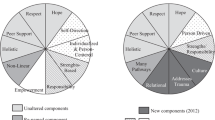Abstract
The national self-help group, Fundamentalists Anonymous (F.A.), has focused attention upon mental problems that may be caused or exacerbated by authoritarian religion. In this article we outline assertions about the mental problems caused by membership in fundamentalist religion, illustrate these with two case histories, briefly discuss intervention strategies, and describe conceptual and empirical issues. While former members have presented problems severe enough to warrant professional treatment, a causal link between their symptoms and their religious membership has not yet been established, because there is little empirical work on the subject.
Similar content being viewed by others
References
Singer, M.T., “Coming Out of the Cults,”Psychology Today, Jan. 1979, 72–82; Conway, F., and Siegelman, J., “Information Disease: Have Cults Created a New Mental Illness?”Science Digest, 1982,90, 86–92.
Lindsey, R., “Isolated Fundamentalist Sects with Powerful Leaders Said to Be Growing,”The New York Times, June 22, 1986, A1.
Yao, R.,There is a Way out. New York, Luce Publications, 1986 (Booklet available from Fundamentalists Anonymous, New York, N.Y.).
op. cit..
Tamney, J.B., and Johnson, S., “The Moral Majority in Middletown,”J. Scientific Study of Religion, 1983,22, 145–157.
op. cit..
Enroth, R., “Churches on the Fringe,”Eternity, Feb. 1986, 17–22.
Galanter, M., “Unification Church (Moonie) Dropouts: Psychological Readjustment After Leaving a Charismatic Religious Group,”Amer. J. Psychiatry, 1983,140, 984–989; Galanter, M.; Rabkin, R.; Rabkin, J.;et al., “The ‘Moonies’: A Psychological Study of Conversion and Membership in a Contemporary Religious Sect,”Amer. J. Psychiatry, 1979,136, 165–170.
Spilka, B.; Hood, R.; and Gorsuch, R.,The Psychology of Religion: An Empirical Approach. Englewood Cliffs, N.J., Prentice-Hall, 1985.
op. cit..
Ibid..
op. cit..
Kolevzon, M.S., and Gottlieb, S.J., “The Impact of Divorce: A Multivariate Study,”J. Divorce, 1983,7, 89–98; Hackney, G.R., and Ribordy, S.C., “An Empirical Investigation of Emotional Reactions to Divorce,”J. Clinical Psychology, 1980,36, 105–110.
op. cit..
Robbins, T., and Anthony, D., “‘CULTS’ VS. ‘SHRINKS’: Psychiatry and the Control of Religious Movements.” In Richardson, H., ed.,New Religions and Mental Health: Understanding the Issues. New York, Edwin Meilen, 1980; Robbins, T.; Anthony, D.; and McCarthy, J., “Legitimating Repression.” In Bromley, D.G., and Richardson, J.T., eds.,The Brainwashing/ Deprogramming Controversy: Sociological, Psychological, and Historical Perspectives. New York, Edwin Mellen, 1979.
op. cit..
Shils, E.A., “Authoritarianism: ‘Right’ and ‘Left.’” In Christie, R., and Johoda, M., eds.,Studies in the Scope and Method of the Authoritarian Personality. Glencoe, Ill., Free Press, 1954; Attemeyer, B.,Right-Wing Authoritarianism. Manitoba, University of Manitoba, 1984.
Johnson, S.D., and Tamney, J.B., “Support for the Moral Majority: A Test of a Model,”J. Scientific Study of Religion, 1984,23, 183–196.
Ibid.; Tamney and Johnson,op. cit.
op. cit.; Galanteret al., op. cit.
Author information
Authors and Affiliations
Additional information
The authors express gratitude to Stephen Strack, Ph.D.; Robert Meagher, Ph.D.; Herman Feifel, Ph.D.; and Ted Schoenberger, M.D., for their helpful comments on previous drafts of this paper.
Rights and permissions
About this article
Cite this article
Hartz, G.W., Everett, H.C. Fundamentalist religion and its effect on mental health. J Relig Health 28, 207–217 (1989). https://doi.org/10.1007/BF00987752
Issue Date:
DOI: https://doi.org/10.1007/BF00987752




